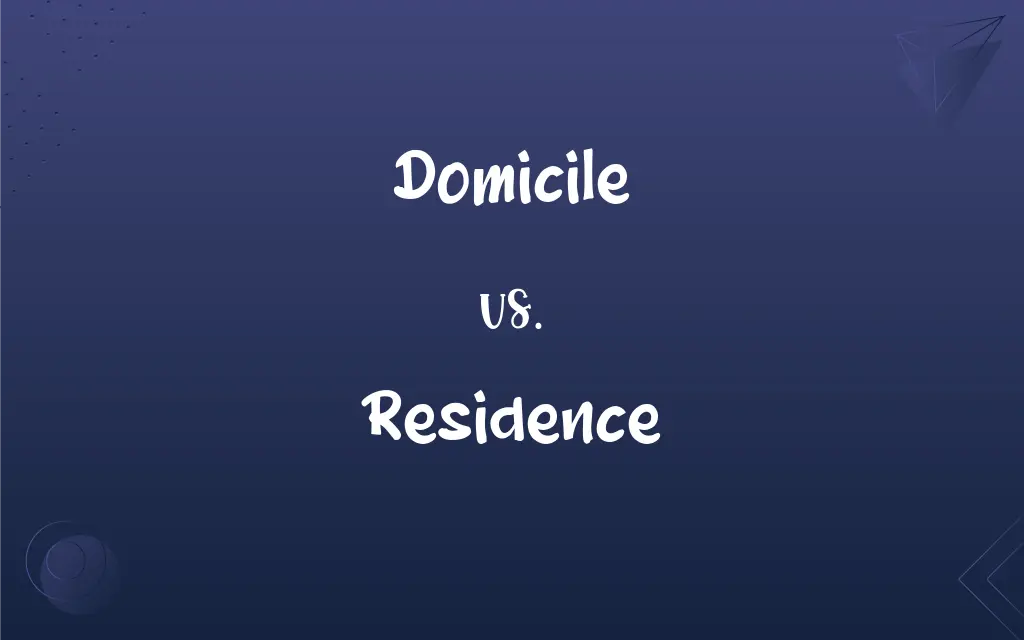Domicile vs. Residence: What's the Difference?
Edited by Aimie Carlson || By Harlon Moss || Published on January 18, 2024
Domicile is a legally recognized permanent home. Residence is a place where one actually lives or stays.

Key Differences
Domicile is a legal term that refers to the place with which a person has a fixed and permanent connection for legal purposes. In contrast, residence refers to any place where a person physically lives or occupies, which can be temporary or seasonal.
A person can have multiple residences at different times or simultaneously, such as a city apartment and a country home. However, a person can have only one domicile at a time, which is considered their permanent legal home.
Domicile is important for legal purposes, including taxation, voting rights, and jurisdiction in legal matters. Residence, while relevant for certain legal issues, typically has less impact on a person's legal status and obligations.
Establishing a domicile involves intention and actions towards making a place one's permanent home, such as obtaining a driver's license or registering to vote there. Residence can be established simply by living in a place for a period, with no requirement of permanence.
Changing one's domicile requires a clear abandonment of the old domicile and establishing a new one with intent to remain indefinitely. In contrast, changing a residence can be a more frequent and less significant legal event.
ADVERTISEMENT
Comparison Chart
Legal Significance
Primary legal home, affects jurisdiction
Place of living, less legal weight
Multiplicity
Only one at a time
Can have multiple residences
Permanence
Permanent and intended as long-term
Can be temporary or seasonal
Purpose
Legal, taxation, voting
Practical, day-to-day living
Change
Requires intent and action for change
Easier to change, less formal process
ADVERTISEMENT
Domicile and Residence Definitions
Domicile
Domicile is a person's fixed, permanent, and legal home.
She changed her domicile to Florida for tax purposes.
Residence
Residence can also mean the structure one lives in.
The residence was a modern, high-rise building.
Domicile
Domicile determines legal jurisdiction in matters like divorce.
The court used his domicile to decide the jurisdiction.
Residence
Residence is where someone lives at a particular time.
His current residence is a downtown apartment.
Domicile
Domicile affects one's voting registration and rights.
Her voting rights were based on her domicile.
Residence
Residence can be a temporary place of stay.
She found a short-term residence during her internship.
Domicile
For tax purposes, one's domicile is crucial.
Changing his domicile affected his state tax obligations.
Residence
One can have multiple residences simultaneously.
They maintain residences in both New York and Paris.
Domicile
Domicile refers to where one intends to return.
Despite working abroad, his domicile remained in Canada.
Residence
Residence refers to physical occupation of a space.
The residence he chose was close to his workplace.
Domicile
A residence; a home.
Residence
The place in which one lives; a dwelling.
Domicile
One's legal residence.
Residence
The act or a period of residing in a place.
FAQs
How does one change their domicile?
Changing domicile involves intent and legal actions, like changing voter registration.
What legally defines a domicile?
Domicile is defined by legal intent to remain indefinitely.
Is a vacation home considered a residence?
Yes, a vacation home can be considered a residence.
Can a residence be temporary?
Yes, a residence can be temporary or seasonal.
How is domicile different from citizenship?
Domicile is about permanent residence, while citizenship is about legal nationality.
Does domicile affect legal jurisdiction?
Yes, domicile determines jurisdiction in legal matters.
Can I have multiple residences?
Yes, you can have multiple residences at the same time.
Is domicile important for taxation?
Domicile is very important for state and federal tax purposes.
How does domicile impact divorce proceedings?
Domicile can determine which state's laws apply in a divorce.
What is a primary residence?
A primary residence is where someone spends most of their time.
Can a college dorm be a residence?
Yes, a college dorm can be considered a temporary residence.
Does owning property establish domicile?
Owning property alone doesn't establish domicile; intent to remain is key.
How does domicile affect voting rights?
Your domicile determines where you can register to vote.
Can I change my residence frequently?
Yes, you can change your residence as often as you move.
What is a secondary residence?
A secondary residence is an additional place where you live part-time.
Is a temporary work relocation a new residence?
Yes, the location during work relocation can be considered a temporary residence.
Is a rental apartment a residence?
Yes, a rental apartment where you live is your residence.
Is domicile relevant for estate planning?
Yes, domicile is crucial in determining estate law applicability.
Does domicile require physical presence?
Domicile requires physical presence and intent to remain.
Can a hotel room be a residence?
A hotel room can be a temporary residence.
About Author
Written by
Harlon MossHarlon is a seasoned quality moderator and accomplished content writer for Difference Wiki. An alumnus of the prestigious University of California, he earned his degree in Computer Science. Leveraging his academic background, Harlon brings a meticulous and informed perspective to his work, ensuring content accuracy and excellence.
Edited by
Aimie CarlsonAimie Carlson, holding a master's degree in English literature, is a fervent English language enthusiast. She lends her writing talents to Difference Wiki, a prominent website that specializes in comparisons, offering readers insightful analyses that both captivate and inform.






































































